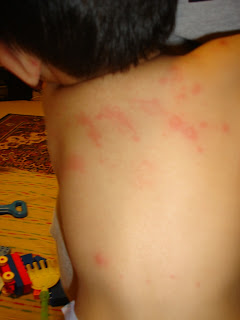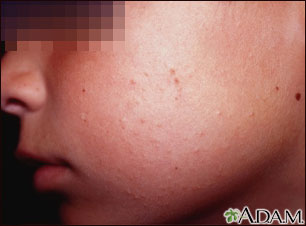Does Your Food--Allergic Child Qualify for a 504 Plan?
A parent of 2 food-allergic kiddo's shared an interesting tidbit with me the other day, of which I was not previously aware.
If your child has a history of anaphylaxis to a food allergen, he/she may be a candidate for a 504 plan, which creates a specific plan outlining the accommodations that may be needed in the school setting to ensure that the student with a disability (in this case, severe food allergy) is not excluded from the full educational resources available to other children due to his/her disability.
From the Department of Education website: Section 504 is a federal law designed to protect the rights of individuals with disabilities in programs and activities that receive Federal financial assistance from the U.S. Department of Education (ED). Section 504 provides: "No otherwise qualified individual with a disability in the United States . . . shall, solely by reason of her or his disability, be excluded from the participation in, be denied the benefits of, or be subjected to discrimination under any program or activity receiving Federal financial assistance . . . ."
Many parents of food-allergic children already meet informally with teachers and school administrators to discuss their child's food allergy, and how best to ensure safety in the learning environment. For the most part, especially for children with milder food allergies, this is sufficient.
However, for those children with a history of anaphylaxis to commonly encountered foods (especially those for which the risk of cross-contamination is high, and which cannot be easily excluded from the school environment), parental anxiety about proper precautions and procedures in the event of a reaction is understandably higher. Even when the relationship with school staff is cooperative and non-adversarial, having a detailed 504 plan in place can be beneficial for all involved, as it puts into writing a legal document which details appropriate educational measures for all individuals involved in the affected child's education. This document can provide guidance regarding everything from bus transportation issues to the provision of a "peanut-free" computer keyboard.
Obviously, creating a 504 plan is an involved process, and is not appropriate for every food-allergic child. But, if after discussion with your child's physician, you determine that your child needs the accommodations provided by a 504 plan, it can be helpful to approach the school with some of the "homework" already completed. As a parent, you are an integral member of the 504 plan team.
To that end, I've discovered an excellent resource created by a mother of a child with severe food allergy, based on research of 504 plans compiled from around the country. This is an outline of a 504 plan which addresses many of the issues facing food-allergic children in the school setting. It is, of course, not intended to replace medical advice, nor does the author claim that is is fully comprehensive. However, it is a formidable effort, and is likely to be very useful to you as you work with your school to ensure that your severely food-allergic child has a safe and healthy learning environment. Here's the link (on the allergysupport.org website): http://allergysupport.org/index.php?option=com_content&task=view&id=16&Itemid=1
If your child has a history of anaphylaxis to a food allergen, he/she may be a candidate for a 504 plan, which creates a specific plan outlining the accommodations that may be needed in the school setting to ensure that the student with a disability (in this case, severe food allergy) is not excluded from the full educational resources available to other children due to his/her disability.
From the Department of Education website: Section 504 is a federal law designed to protect the rights of individuals with disabilities in programs and activities that receive Federal financial assistance from the U.S. Department of Education (ED). Section 504 provides: "No otherwise qualified individual with a disability in the United States . . . shall, solely by reason of her or his disability, be excluded from the participation in, be denied the benefits of, or be subjected to discrimination under any program or activity receiving Federal financial assistance . . . ."
Many parents of food-allergic children already meet informally with teachers and school administrators to discuss their child's food allergy, and how best to ensure safety in the learning environment. For the most part, especially for children with milder food allergies, this is sufficient.
However, for those children with a history of anaphylaxis to commonly encountered foods (especially those for which the risk of cross-contamination is high, and which cannot be easily excluded from the school environment), parental anxiety about proper precautions and procedures in the event of a reaction is understandably higher. Even when the relationship with school staff is cooperative and non-adversarial, having a detailed 504 plan in place can be beneficial for all involved, as it puts into writing a legal document which details appropriate educational measures for all individuals involved in the affected child's education. This document can provide guidance regarding everything from bus transportation issues to the provision of a "peanut-free" computer keyboard.
Obviously, creating a 504 plan is an involved process, and is not appropriate for every food-allergic child. But, if after discussion with your child's physician, you determine that your child needs the accommodations provided by a 504 plan, it can be helpful to approach the school with some of the "homework" already completed. As a parent, you are an integral member of the 504 plan team.
To that end, I've discovered an excellent resource created by a mother of a child with severe food allergy, based on research of 504 plans compiled from around the country. This is an outline of a 504 plan which addresses many of the issues facing food-allergic children in the school setting. It is, of course, not intended to replace medical advice, nor does the author claim that is is fully comprehensive. However, it is a formidable effort, and is likely to be very useful to you as you work with your school to ensure that your severely food-allergic child has a safe and healthy learning environment. Here's the link (on the allergysupport.org website): http://allergysupport.org/index.php?option=com_content&task=view&id=16&Itemid=1



The Americans with Disabilities Act Amendment Act passed on January 2009 names food allergies as a disability because it limits the major life activity of eating. Therefore most children (if not all) with food allergies are eligible for a 504 plan. Your child doesn't need to have a history of anaphylaxis to qualify. Just bring to the meeting ADAAA (see pdf link below) and your child will qualify based on this disability as "it limits the major life activity of eating". Most schools (and doctors from my experience) didn't know about ADAAA. So it's always a good idea to have a copy of the documentation handy during meetings and appointments. By the way, my daughter has a 504.
ReplyDeleteRead this Parent Advocacy Brief:
http://www.ncld.org/images/stories/Publications/AdvocacyBriefs/UnderstandingADAAA-Section504/UnderstandingADAAA-Section504.pdf
Good post! Thanks for sharing.
Thanks for the updated information, Thanita. You are, as always, an excellent resource!
ReplyDeleteI agree that one need not have a history of anaphylaxis to qualify for a 504 plan. However, I do have many food-allergic patients for which I believe a 504 is probably not indicated, even though the child is eligible (transient hives around the mouth after eating strawberries, for example). The parent needs to weigh the severity of allergy and risk of exposure in the school setting in order to determine whether he/she wishes to pursue a 504 for his/her child.
An example of an instance in which a non-anaphylactic child may wish to have a 504 in place is where a child suffers from severe atopic dermatitis which is exacerbated by ingestion or contact with an ubiquitous food allergen. In this case, the long-lasting detrimental impact from accidental exposure would warrant the 504, even in the absence of a life-threatening reaction.
Thanks again!
We have incidents where a child was taken out of the classroom and left in the hallway alone, after being exposed to his/her allergen with the explanation that it was "for the child's safety". In this instance a 504 would be ideal. So many things went wrong. The allergen should not be used as a manipulative in the classroom, the child was exposed yet left out in the hallway alone without medical attention, the room was contaminated yet not decontaminated before the child back in the class. I've heard this story from other parents countless times. It happens more than one thinks. Having a 504 would put in place safeguards so this will not happen.
ReplyDeleteThe problem is some schools don't adhere to the 504 and you may not know. This is why I encourage families to ask questions. Talk to your child and the school/teacher. Pay a surprise visit to volunteer in class. Have lunch with your child. Stay on top of it. It's equally our (the parents) responsibility as well as the school's. After all, it's not a magic paper but I'd rather have one that not :)